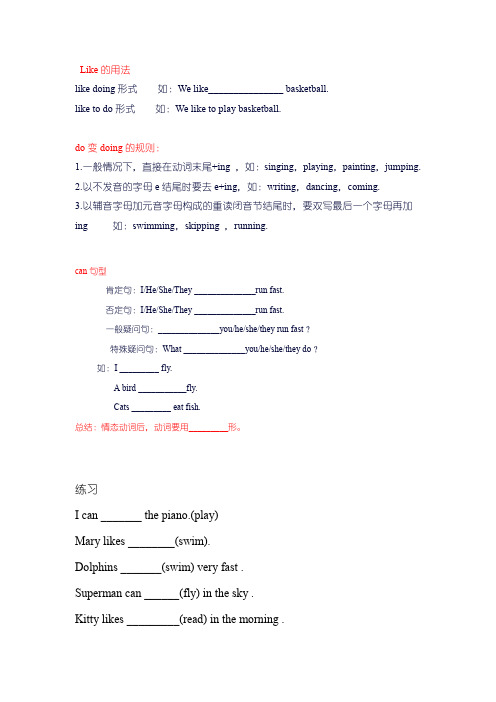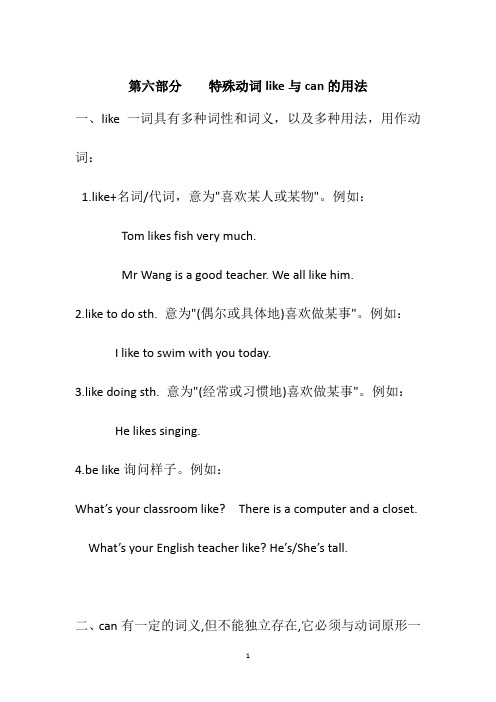五年级英语语法练习(can和like的用法)
- 格式:doc
- 大小:19.00 KB
- 文档页数:2

人教版小学五年级英语上册知识点归纳及练习LEKIBM standardization office【IBM5AB- LEKIBMK08- LEKIBM2C】五年级上册英语知识点归纳及同步练习Book 5 A Unit 1 My New Teachers句型: (1) 询问人----- Who’s your math teacher ----- Miss Zhao . 你们的数学老师是谁。
是赵老师。
-----Who’s that woman -----She is my mother . 那个妇女是谁她是我妈妈。
(2) 询问人的外貌特征-----What ’s he like ----- He ’s tall and strong . 他长什么样子他很高很健壮。
----- Is she very old -----No ,she is very young .-----Is he very short -----No, she isn’t . She is very tall .(3) 询问人的性格特点----- Is she very quiet ----- No ,she isn’t. She ’s very active .她很文静吗不,她很活跃。
----- Is she very strict ----- Yes , she is . But she is very kind.她很严厉吗是的。
但是她很和蔼。
Exercise For Unit 1(一)写出下列词的反义词young ___________ quiet _____________ tall ___________strong _________ new ___________ long _________ strict _____________ (二)填上适当的单词使句子完整通顺。
1 A: ___________ is the girlB: ___________ my sister .1A; _______ Tom’s father like?B: _________ __________ thin and quiet.2A: Is your English teacher _________B: No, she _________ . She is short . _________ she is pretty.4:Mr. Ma is not young .He is __________.3Miss Zhao is our math teacher . She is very ________ .But she is very kind .(三) 补全对话1 A:___________________________________________B: I’m fine .Thank you .A: ___________________________________________B: She is my sister .A: ___________________________________________B: No ,___________________ . She is very active .2 A: ___________________________________________B: Miss White is my English teacher .A: ___________________________________________B: She is very tall and thin .A:____________________________________________B: Yes , she is very young .A: ____________________________________________B: Yes ,___________________ .But she is very kind.(四) 根据所给的信息完成句子。

Like的用法like doing形式如:We like_______________ basketball.like to do形式如:We like to play basketball.do变doing的规则:1.一般情况下,直接在动词末尾+ing ,如:singing,playing,painting,jumping.2.以不发音的字母e结尾时要去e+ing,如:writing,dancing,coming.3.以辅音字母加元音字母构成的重读闭音节结尾时,要双写最后一个字母再加ing 如:swimming,skipping ,running.can句型肯定句:I/He/She/They ______________run fast.否定句:I/He/She/They ______________run fast.一般疑问句:______________you/he/she/they run fast?特殊疑问句:What ______________you/he/she/they do?如:I _________ fly.A bird ___________fly.Cats _________ eat fish.总结:情态动词后,动词要用_________形。
练习I can _______ the piano.(play)Mary likes ________(swim).Dolphins _______(swim) very fast .Superman can ______(fly) in the sky .Kitty likes _________(read) in the morning .What _____(do) the men do ? _______(be) they doctors ?He can ________(sing) and_______(dance),She likes __________(run) .--_______ she ________(like) _______(fly) a kite ? --No,she doesn’t . Can you ____________(count) to three ?Mr Wang likes __________(teach) students .Girls like _______ ropes .。
](https://img.taocdn.com/s1/m/bb30f4200c22590103029d16.png)
(完整)like的基本用法习题(小学)编辑整理:尊敬的读者朋友们:这里是精品文档编辑中心,本文档内容是由我和我的同事精心编辑整理后发布的,发布之前我们对文中内容进行仔细校对,但是难免会有疏漏的地方,但是任然希望((完整)like的基本用法习题(小学))的内容能够给您的工作和学习带来便利。
同时也真诚的希望收到您的建议和反馈,这将是我们进步的源泉,前进的动力。
本文可编辑可修改,如果觉得对您有帮助请收藏以便随时查阅,最后祝您生活愉快业绩进步,以下为(完整)like的基本用法习题(小学)的全部内容。
关于like的练习一.选择1. Do you like ______ housework?A。
do B。
does C。
doing D. did2. I ______ playing basketball.A。
am not like B. don't like C. isn’t D. likes 二.填空1. I like _____________。
(dance)2。
He likes ____________.(swim)3. You like ____________.(eat)4. They like____________。
(dive)5. We like ___________(sing)English songs.6。
My father likes_______(play)golf.7. Eddie's mother likes________(cook)8。
———Do you like dancing?----Yes, I________。
9. —--—-Can you dancing?—-——--Yes, I __________.10. —-—--Do you like skating?—--——No, I ________。
11. I _______ (like) reading.12。

第六部分特殊动词like与can的用法一、like一词具有多种词性和词义,以及多种用法,用作动词:1.like+名词/代词,意为"喜欢某人或某物"。
例如:Tom likes fish very much.Mr Wang is a good teacher. We all like him.2.like to do sth. 意为"(偶尔或具体地)喜欢做某事"。
例如:I like to swim with you today.3.like doing sth. 意为"(经常或习惯地)喜欢做某事"。
例如:He likes singing.4.be like询问样子。
例如:What’s your classroom like? There is a computer and a closet. What’s your English teacher like? He’s/She’s tall.二、can有一定的词义,但不能独立存在,它必须与动词原形一起构成谓语。
can没有人称和数的变化。
其具体用法如下:1.表示"能、会",指脑力或体力方面的"能力"。
例如:I can speak English. Jim can swim but I can't.2.表示"可以",常用于口语中,指许可或请求做某事。
例如:Can I have a cup of tea, please? You can go out.三、like与can的练习:( )1. Amy likes ping-pong. She can ping-pong well.A. play, playB. playing, play( ) 2. My sister likes . A. sing B. singing( )3.They like to music.A.listeningB. listen( )4.I like , because I eat ice-cream.A. summer , canB. winter, like( )5.I can sing well, but I can’t . A. danced B. dance( )6.Can you the vilion? No , I .A. play, can’tB. playing , can’t( )7.Can Mike do Chinese kung fu? Yes, .A. he canB. he can’t( )8.What’s your hobby? I drawing pictures. A. can B. like( )9.What’s your mother ? She’s young and pretty.A. likeB. liking( )10. I have some soup? Here you are.A. CanB. can( )11. I like to with snow. A. play B. playing ( )12.Miss Wang is a kind teacher. She speakEnglish well. We all her. A.like, can B. can, like。

Unit3 Our animal friends一、have/has 的用法及练习(一)have/has的肯定陈述句基本结构为“主语+ have/has +某物.”。
当主语为第三人称单数时用has,其余人称作主语时用have。
如:You have a bag and she has a doll.你有一个包,她有一个洋娃娃。
(二)have/has的否定陈述句基本结构为“主语+ don't/doesn't have +某物”。
当主语为第三人称单数时用doesn't have,其余人称作主语时用don't have。
此句型的同义句型为“主语+ have/has no 十某物”。
如:I don't have an animal friend.= I have no animal friend我没有动物朋友。
(三)含have的一般疑问句及其答语1、—Do +主语(除第三人称单数)+ have +某物?—Yes,主语+ do./No,主语+ don't如:—Do you have a ruler?你有一把尺子吗?—Yes,I do.是的,我有。
2、—Does +主语(第三人称单数)+ have +某物?—Yes,主语+ does./No,主语+doesn't.如:—Does Mike have a dictionary?迈克有一本字典吗?—No,he doesn't,不,他没有。
(四)含have的特殊疑问句及其答语—What + do/does 十主语+ have?—主语+ have/has +某物.如:—What do you have? 你有什么?—I have a nice doll.我有一个漂亮的洋娃娃。
(五)have/has 和there be 的区别两者都表示“有”。
have/has 强调所属关系,通常放在主语之后,即“主语+ have/has 十某物”;there be强调“存在”,放在句首,即“There be 十名词+表示地点的介词短语.”。

【Like 的用法归纳】like 一词具有多种词性和词义,以及多种用法。
V.用作动词(v.),意思为"爱,爱好,喜欢",无进行时态,既表示对人或者事物的真挚的感情,又表示"对某事有着浓厚的兴趣、爱好"。
后面可以接名词、代词、动名词或者不定式。
1.like+名词/代词,意为"喜欢某人或某物"。
Eg:汤姆非常喜欢鱼。
________________________________________Tom likes fish very much.王老师是个好老师,我们都喜欢他________________________________________Mr Wang is a good teacher.We all like him.2.like to do sth. 意为"喜欢做某事(偶尔的、一次性的具体的行为) "。
想去做某事(表示有个趋向性,好像是要到某处去做某事)like to do sth 则常指某个具体的动作,表示偶尔一次喜欢做某事、或者突然喜欢干某事.Eg: 她今天下午想游泳.(特指某一次的动作)________________________________________She likes to swim this afternoon.她今天下午想游泳.(特指某一次的动作)另外,在搭配(使用方法)上,“like to do”一般与“would”搭配表示意愿.我愿意和你去游泳.________________________________________I would like to swim with you.我愿意和你去游泳.________________________________________你愿意去滑冰吗?________________________________________Would you like to skate.今天太热了,我想去游泳。
五年级英语语法练习(can和like的用法)1. We can sing and dance.改为否定句__________________________________________________________ 2. She can play the piano. 改为否定句__________________________________________________________ 3. I can swim. 改为否定句__________________________________________________________ 4. It can run. 改为否定句__________________________________________________________ 5. I can sing some Chinese songs.改为一般疑问句,并作肯定回答。
__________________________________________________________ 6. He can draw pictures. 改为一般疑问句,并作否定回答。
__________________________________________________________ 7.They can ride bikes. 改为一般疑问句,并作肯定回答。
__________________________________________________________ 8. The cat can climb the trees. 改为一般疑问句,并作否定回答。
__________________________________________________________ 9. I can draw a bird.对划线部分提问__________________________________________________________ 10. Tom can sing an English song. 对划线部分提问__________________________________________________________ 11. My mother can play the violin. 对划线部分提问__________________________________________________________ 12. David can make a puppet. 对划线部分提问__________________________________________________________ 13. He can swim. 对划线部分提问__________________________________________________________ 14. We can dance. 对划线部分提问__________________________________________________________ 15.My brother can make a model plane. 对划线部分提问__________________________________________________________16. I like masks. (否定句)I ________ _______ masks.17. I like horses. (一般疑问句,肯、否定回答)_________ _______ __________ horses? Yes, I _______. No, I _________.18. I like tigers. (对划线部分提问)_________ ________ you _________?19. I can sing. (否定句) I ___________sing.20. He can skate. (否定句) He ___________skate.21. They can dance. (否定句) They __________dance.22. I can play the piano. (一般疑问句,肯、否定回答)_________ _________ play the piano?Yes, I ________. No, I _________.23. She can read English. (一般疑问句,肯、否定回答)_______ ________read English?Yes, ______ ______. No, _______ ______.24. They can play chess. (一般疑问句,肯、否定回答)______ ______ play chess?Yes, ______ _____. No, ______ ______.25. I can sing.(对划线部分提问)______ can ______ _______?26. We can draw pictures. (对划线部分提问)__________ _________ ________ _________?27. Helen can swim. (对划线部分提问)______ ______ ______ _______?28. She can play the violin. (对划线部分提问)______ can _______ _________?29. I like masks. (否定句) I ________ _______ masks.30. I like horses. (一般疑问句,肯、否定回答)_________ _______ __________ horses?Yes, I _______. No, I _________.31. I like tigers. (对划线部分提问)_________ ________ you _________?。
like的用法练习题一、选择题1. 他喜欢打篮球。
A. He likes to play basketball.B. He like playing basketball.C. He likes playing basketball.D. He liking to play basketball.2. 你不喜欢吃苹果,对吗?A. You don't like eating apples, do you?B. You like eating apples, do you?C. You don't like to eat apples, do you?D. You like to eat apples, don't you?3. 她看起来像她的妈妈。
A. She looks like her mother.B. She looks like to her mother.C. She like her mother.D. She look likes her mother.二、填空题1. 我喜欢______(read)书。
2. 他们不喜欢______(go)游泳。
3. 他看起来______(like)一个老师。
三、句型转换1. 将下列句子改为否定句:He likes playing football.She likes to eat ice cream.2. 将下列句子改为疑问句:They like watching movies.You like listening to music.四、翻译题1. 他喜欢在周末去公园散步。
2. 他们不喜欢吃辛辣的食物。
3. 你喜欢哪个季节?五、完形填空A. likes; doing; likes; look likeB. like; do; like; looks likeC. likes; do; likes; look likeD. like; doing; likes; looks like六、阅读理解John is a middle school student. He has many hobbies. He likes playing basketball, reading books and listening to music. But he doesn't like eating vegetables. His best friend, Mike, is different from him. Mike likes eating vegetables and he doesn't like playing sports. They both like studyingEnglish and they want to be translators in the future.Answer the following questions:1. What are John's hobbies?2. What does John not like?3. What does Mike like?七、匹配题请将左栏的动词与右栏的名词搭配,形成正确的短语。
一.there be 句型总结1。
there is/are 表示某处有某物,there is后面接单数,或不可数名词,There are后面接可数名词的复数.2.就近原则,靠近谁,就用谁的形式,单数在前用is,复数在前用are。
3.否定句,not 加在be 动词后面,遇到some变any4。
变疑问,be 句首站,there 跟在be 后面,遇到some变any。
肯定回答,Yes,there is/are. No, there is/are not.5。
对数字提问,用how many +可数名词复数+are there 。
?用所给词的适当形式填空1.There is ______(a) orange coat on the chair.2。
There ______(be)some soup on the table。
3.There ______(be) three bears in front of her。
4。
There ______(be)a pen and two rulers in basket。
5。
There______( not) any cakes here?6.There______(be) two glasses of juice on the table。
7.There______(be)a bird in the tree.8.______(be)there _______(some)computer rooms?9。
How many ______(desk) and ______(chair) are there in the classroom?10.How many classrooms _______(be) there in our school?句型转换1.There is some soup on the table。
否定句:_____________________________________________一般疑问句并作肯定回答______________________________________________ 2.There are forty doctors in the hospital。
五年级英语语法练习(can和likeの用法)
1. We can sing and dance.改为否定句
__________________________________________________________ 2. She can play the piano. 改为否定句
__________________________________________________________ 3. I can swim. 改为否定句
__________________________________________________________ 4. It can run. 改为否定句
__________________________________________________________ 5. I can sing some Chinese songs.改为一般疑问句,并作肯定回答。
__________________________________________________________ 6. He can draw pictures. 改为一般疑问句,并作否定回答。
__________________________________________________________ 7.They can ride bikes. 改为一般疑问句,并作肯定回答。
__________________________________________________________ 8. The cat can climb the trees. 改为一般疑问句,并作否定回答。
__________________________________________________________ 9. I can draw a bird.对划线部分提问
__________________________________________________________ 10. Tom can sing an English song. 对划线部分提问
__________________________________________________________ 11. My mother can play the violin. 对划线部分提问
__________________________________________________________ 12. David can make a puppet. 对划线部分提问
__________________________________________________________ 13. He can swim. 对划线部分提问
__________________________________________________________ 14. We can dance. 对划线部分提问
__________________________________________________________ 15.My brother can make a model plane. 对划线部分提问
__________________________________________________________
16. I like masks. (否定句)
I ________ _______ masks.
17. I like horses. (一般疑问句,肯、否定回答)
_________ _______ __________ horses? Yes, I _______. No, I _________.
18. I like tigers. (对划线部分提问)
_________ ________ you _________?
19. I can sing. (否定句) I ___________sing.
20. He can skate. (否定句) He ___________skate.
21. They can dance. (否定句) They __________dance.
22. I can play the piano. (一般疑问句,肯、否定回答)
_________ _________ play the piano?
Yes, I ________. No, I _________.
23. She can read English. (一般疑问句,肯、否定回答)
_______ ________read English?
Yes, ______ ______. No, _______ ______.
24. They can play chess. (一般疑问句,肯、否定回答)
______ ______ play chess?
Yes, ______ _____. No, ______ ______.
25. I can sing.(对划线部分提问)
______ can ______ _______?
26. We can draw pictures. (对划线部分提问)
__________ _________ ________ _________?
27. Helen can swim. (对划线部分提问)
______ ______ ______ _______?
28. She can play the violin. (对划线部分提问)
______ can _______ _________?
29. I like masks. (否定句) I ________ _______ masks.
30. I like horses. (一般疑问句,肯、否定回答)
_________ _______ __________ horses?
Yes, I _______. No, I _________.
31. I like tigers. (对划线部分提问)
_________ ________ you _________?。